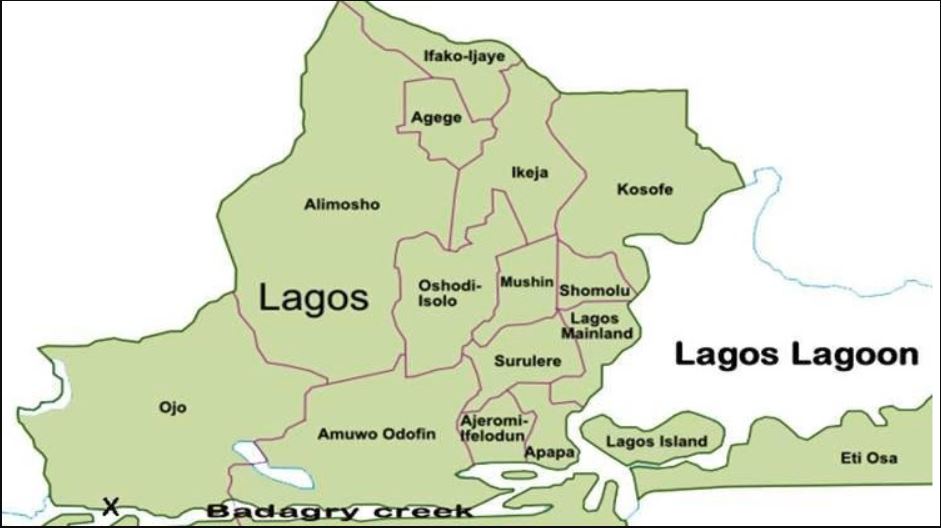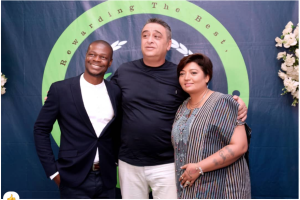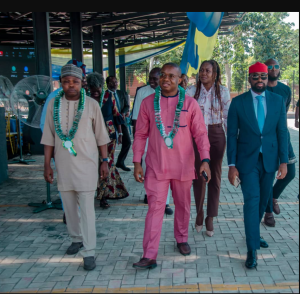

The allegations surrounding the sale of coastal road alignment land in Okun Ajah, Lagos State, underscore the critical need for robust community relations and effective engagement in Corporate Social Responsibility (CSR) and sustainable development efforts.
CSR REPORTERS recalls that the Indigenes and residents of Okun Ajah in the Eti Osa Local Government area of Lagos State had appealed to the Federal and Lagos State governments to probe an alleged sale of the coastal road alignment land to property owners.
They however refuted claims by the acting Baale of the town, Sikiru Olukosi, that 2000 houses were saved by the Federal Government’s rerouting of the road, insisting the actual number was far fewer.
It was gathered during a visit to the area on Wednesday that the residents blamed the ongoing issues surrounding the Lagos-Calabar Highway at the Okun Ajah corridor on unscrupulous land grabbers who claimed sold land on the coastal road to the public despite knowing it was meant for road construction.
This outcry was sparked by an alleged “Appreciation Letter” from the acting Baale of the town accused of colluding with some alleged lawbreakers to build on the coastal road alignment.
The Akogun of Okun Ajah, Saheed Olukosi, told our correspondent, “It is a grand conspiracy perpetrated by the Baale of Okun Ajah and the Secretary, Kamoru Ogidan with the Igbo landlords that they sold the coastal roads to.
This situation has far-reaching implications for Nigeria, its citizens, and corporate entities, particularly in the context of fostering trust, transparency, and long-term community development.
This controversy highlights the importance of ethical practices and accountability. The alleged collusion between local leaders and unscrupulous land grabbers to sell land designated for public infrastructure not only undermines community trust but also jeopardizes essential development projects. Companies operating in such environments must prioritize ethical conduct and transparent dealings to maintain their social license to operate. This incident serves as a stark reminder that CSR is not just about philanthropy but also about ensuring that business operations do not harm the community or environment.
Effective community relations are crucial in avoiding conflicts like the one in Okun Ajah. Engaging with local stakeholders, understanding their needs, and addressing their concerns proactively can prevent misunderstandings and foster a collaborative approach to development. Companies should establish clear communication channels and involve community members in decision-making processes, particularly for projects that significantly impact their lives. This inclusive approach can build trust and ensure that development initiatives are well-received and sustainable.
The situation in Okun Ajah also underscores the need for transparency and integrity in infrastructure development. Allegations of land sales and the construction of houses on designated road alignments point to a breakdown in regulatory oversight and enforcement. For sustainable development, it is imperative that all stakeholders, including government agencies, private sector players, and community leaders, adhere to established regulations and standards. Transparent processes and stringent enforcement of laws are necessary to ensure that infrastructure projects benefit the wider community and do not become avenues for illicit gains.
For Nigeria, addressing such issues is critical to achieving its sustainable development goals. Infrastructure projects like the Lagos-Calabar Coastal Road are vital for economic growth and connectivity. However, their success depends on transparent planning and execution. Ensuring that these projects are not derailed by illegal activities or local conflicts is essential for the country’s development. The government must take decisive action to investigate and resolve such disputes, demonstrating its commitment to rule of law and sustainable development.
Corporates, particularly those involved in infrastructure and real estate, must take a proactive stance in promoting sustainable practices. This includes conducting thorough due diligence, ensuring compliance with land use regulations, and engaging in ethical business practices. By doing so, they can contribute to sustainable urban development and enhance their reputation as responsible corporate citizens.
Ultimately, the role of CSR Reporters, becomes increasingly important in such scenarios. CSR Reporters can help document and highlight unethical practices, advocate for community interests, and provide expert advice on steering the complex landscape of CSR and sustainability. Their involvement can ensure that corporates are held accountable and that community voices are heard and respected.
The allegations of land sale in Okun Ajah have significant implications for CSR and sustainable development in Nigeria. They highlight the need for ethical practices, effective community engagement, transparency, and strict regulatory enforcement. By addressing these issues, Nigeria can ensure that its infrastructure projects are not only successful but also equitable and sustainable, benefiting all stakeholders involved.
CSR Reporters can play a pivotal role in guiding and supporting these efforts, ensuring that CSR initiatives are genuinely impactful and aligned with sustainable development goals.









